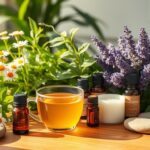As the seasons change, many individuals struggle with the onset of seasonal allergies, often seeking relief through traditional medications. However, there is a growing trend towards exploring natural, herbal alternatives that offer a gentle yet effective solution to allergy symptoms. This comprehensive guide delves into the world of herbal remedies, empowering you to find natural allergy relief and improve your overall well-being.
Key Takeaways
- Discover the power of natural herbs and botanicals to alleviate allergy symptoms
- Explore effective anti-inflammatory and antihistamine properties of various herbal remedies
- Learn how to boost your immune system and prevent allergic reactions with specific herbs
- Understand the importance of proper dosage and potential interactions when using herbal supplements
- Incorporate lifestyle changes to enhance the effectiveness of your herbal allergy relief regimen
Understanding Seasonal Allergies and Their Impact
Seasonal allergies, also known as hay fever or pollen allergies, are a common ailment that affects millions of individuals worldwide. These allergies are typically triggered by the release of pollen or mold spores into the air, which can wreak havoc on the respiratory system and cause a range of unpleasant symptoms.
Common Allergy Triggers and Symptoms
The primary culprits behind seasonal allergies are often tree, grass, and weed pollen, as well as mold spores. When these particles enter the body, they can cause the immune system to overreact, leading to symptoms such as sneezing, itchy and watery eyes, a runny or congested nose, and persistent coughing or wheezing. In severe cases, allergies can even trigger asthma attacks or sinus infections.
The Role of Natural Solutions in Allergy Management
As more individuals seek gentler, more holistic approaches to managing their allergies, natural solutions are gaining popularity. Herbal remedies, such as seasonal allergy remedies, pollen allergy aids, and hay fever herb mixtures, offer a promising alternative to traditional medication, often with fewer side effects and a more tailored approach to individual needs.
Why Choose Herbal Alternatives
The appeal of herbal alternatives lies in their ability to address the root causes of allergies, rather than simply masking the symptoms. Many natural herbs and botanicals possess anti-inflammatory, antihistamine, and immune-boosting properties that can help the body better manage the allergy response, providing long-term relief without the potential for dependency or unwanted side effects.

“Embracing natural solutions for allergy management allows individuals to take a more proactive, holistic approach to their health and well-being.”
Top Herbal Remedies for Allergies: A Comprehensive Guide
Navigating the world of allergies can be a daunting task, but nature has blessed us with a bounty of herbal remedies that can provide much-needed relief. In this comprehensive guide, we’ll explore some of the top herbal allies for combating seasonal allergies, including their unique properties and potential benefits.
Butterbur: This unassuming plant has gained popularity as a natural decongestant and anti-inflammatory. Its active compounds, such as petasin, can help alleviate nasal congestion, sneezing, and itchy eyes, making it a potent herbal allergy treatment.
Stinging Nettle: Often overlooked, this prickly herb is a true powerhouse when it comes to nasal decongestant herbs. Stinging nettle has been shown to reduce the release of histamine, the culprit behind many allergy symptoms, offering a natural alternative to over-the-counter antihistamines.
Quercetin: This flavonoid, found in a variety of fruits and vegetables, is a renowned immune-boosting botanical with anti-inflammatory properties. Quercetin can help stabilize mast cells, preventing the release of histamine and providing relief for allergy sufferers.
| Herbal Remedy | Key Properties | Potential Benefits |
|---|---|---|
| Butterbur | Anti-inflammatory, decongestant | Reduces nasal congestion, sneezing, and itchy eyes |
| Stinging Nettle | Antihistamine, anti-inflammatory | Alleviates allergy symptoms by reducing histamine release |
| Quercetin | Antioxidant, mast cell stabilizer | Supports immune function and provides anti-inflammatory relief |
These are just a few of the remarkable herbal allergy treatments that nature has to offer. By understanding the unique properties of these and other botanicals, you can take a more holistic approach to managing your allergy symptoms and find the relief you’ve been seeking.

Powerful Anti-Inflammatory Herbs for Allergy Relief
Dealing with seasonal allergies can be a frustrating experience, but nature has provided us with a collection of powerful anti-inflammatory herbs that can offer much-needed relief. From the vibrant turmeric root to the soothing ginger, these natural remedies possess the ability to reduce inflammation and alleviate allergy symptoms.
Turmeric and Ginger Benefits
Turmeric, a vibrant yellow spice, is renowned for its active compound curcumin, which boasts impressive anti-inflammatory properties. By inhibiting the production of inflammatory molecules, turmeric can help tame the immune response that triggers allergy symptoms like nasal congestion and itchy eyes. Ginger, another versatile herb, contains gingerol, a compound that can also suppress inflammation and provide allergy relief.
Nettle Leaf Properties
The humble nettle leaf is a true allergy-fighting powerhouse. Rich in natural antihistamines, nettle leaf can help block the release of histamine, the chemical responsible for many allergy symptoms. Additionally, nettle leaf contains anti-inflammatory compounds that can soothe irritated nasal passages and airways.
Green Tea Applications
Green tea, with its high concentration of beneficial polyphenols, is a remarkable natural ally in the fight against allergies. The antioxidant and anti-inflammatory properties of green tea can help reduce inflammation and provide relief from sneezing, itching, and other allergy-related discomforts. Incorporating green tea into your daily routine can be a simple yet effective way to manage allergy symptoms.
By harnessing the power of these anti-inflammatory herbs, you can explore natural solutions to find much-needed relief from the challenges of seasonal allergies. Incorporating turmeric, ginger, nettle leaf, and green tea into your daily regimen can help you breathe easier and reclaim your quality of life.
Natural Antihistamines: From Garden to Medicine Cabinet
Battling seasonal allergies often means relying on synthetic antihistamines, but there’s a growing interest in exploring natural alternatives. Discover the power of plants that can act as natural antihistamines, offering relief without the potential side effects of traditional medications.
One of the most well-known natural antihistamines is chamomile. This soothing herb contains compounds that can help reduce inflammation and histamine production, easing allergy symptoms like sneezing, itching, and watery eyes. Chamomile can be brewed into a tea or used topically as a compress to alleviate skin irritation.
Another herb with antihistamine properties is basil. Rich in the compound rosmarinic acid, basil can help block the release of histamine and reduce nasal congestion. You can incorporate fresh basil into your meals or sip on basil-infused tea to harness its benefits.
For a refreshing option, consider peppermint. This versatile herb contains menthol, which can help open up nasal passages and provide a cooling sensation to soothe allergy-related irritation. Peppermint tea or essential oil can be used to alleviate symptoms.
“Harnessing the power of nature’s antihistamines can be a game-changer for those seeking natural relief from seasonal allergies.”
By understanding the natural antihistamine properties of these and other herbs, you can explore herbal allergy treatments and incorporate them into your seasonal allergy management routine. Whether you grow them at home or find them in your local health food store, these botanical allies can be a valuable addition to your medicine cabinet.

Essential Immune-Boosting Botanicals for Allergy Prevention
As the seasons change, many individuals face the challenges of seasonal allergies. Fortunately, nature provides us with an array of immune-boosting botanicals that can help prevent and alleviate allergy symptoms. In this section, we’ll explore three powerful herbs known for their ability to strengthen the immune system and provide natural allergy relief.
Echinacea and Its Properties
Echinacea, a beloved herbal remedy for allergies, is renowned for its immune-modulating properties. This vibrant purple flower has been shown to enhance the body’s natural defenses, helping to reduce the severity and duration of allergy-related symptoms. Echinacea’s anti-inflammatory and antiviral capabilities make it a valuable addition to any allergy relief supplement regimen.
Elderberry Benefits
The humble elderberry is a true powerhouse when it comes to immune-boosting botanicals. Rich in antioxidants and vitamins, elderberry has been used for centuries to support the body’s natural ability to fight off infections and seasonal ailments. Studies have shown that elderberry can help reduce the severity and duration of allergy symptoms, making it a natural choice for those seeking relief.
Astragalus Root Uses
Astragalus root, a staple in Traditional Chinese Medicine, has garnered attention for its remarkable ability to strengthen the immune system. This adaptogenic herb has been found to enhance the body’s resistance to environmental stressors, including those that trigger allergic reactions. Incorporating astragalus root into your herbal remedies for allergies can help you better manage your symptoms and maintain overall well-being.

By harnessing the power of these immune-boosting botanicals, individuals can take a proactive approach to managing their allergies and maintaining their health throughout the year. Incorporating these natural remedies into your lifestyle can provide a safe and effective way to find relief and support your body’s natural defenses.
Creating Your Own Herbal Allergy Relief Blends
If you suffer from seasonal hay fever or other allergies, you don’t have to settle for over-the-counter medications. Instead, consider crafting your own personalized herbal allergy treatments using a variety of natural antihistamines. By blending specific herbs and botanicals, you can create a tailored solution that addresses your unique symptoms and preferences.
One popular option is to make your own herbal tea blend. Try combining ingredients like nettle leaf, chamomile, and ginger to soothe inflammation and histamine response. You can also experiment with tinctures, which extract the active compounds from herbs into an alcohol or glycerin base. Elderberry, for instance, has been shown to have potent antiviral and immune-boosting properties.
For topical relief, essential oil blends can be incredibly effective. Diffuse or apply diluted mixtures of lavender, peppermint, and lemon balm to help clear congestion and calm irritated sinuses. Remember to always dilute essential oils in a carrier oil before use, and consult with a healthcare provider if you have any concerns.
| Herb | Benefits for Allergy Relief |
|---|---|
| Nettle Leaf | Reduces inflammation and histamine response |
| Turmeric | Powerful anti-inflammatory properties |
| Echinacea | Boosts immune function and fights infection |
| Elderberry | Provides antiviral and antioxidant support |
With a little experimentation, you can create your own unique hay fever herb mixtures that provide effective, natural relief for your allergy symptoms. Embrace the power of plants and take control of your health this allergy season.
Best Practices for Using Herbal Supplements Safely
While herbal remedies for herbal allergies and allergy relief supplements can be beneficial, it’s crucial to use them responsibly. Proper dosage, potential interactions, and consulting with healthcare providers are key considerations when incorporating herbal allergy treatments into your wellness routine.
Proper Dosage Guidelines
When using herbal supplements, it’s essential to follow the recommended dosage instructions carefully. Factors like your age, health status, and the specific herb you’re taking can all influence the appropriate amount. Start with the lowest recommended dose and gradually increase if needed, closely monitoring your body’s response.
Potential Interactions
Herbal remedies can sometimes interact with medications or existing health conditions. Before adding a new supplement to your regimen, consult your healthcare provider to ensure it won’t interfere with any treatments you’re currently undergoing. They can provide guidance on safe usage and potential side effects.
When to Consult a Healthcare Provider
- If you’re pregnant, nursing, or have a pre-existing medical condition
- If you’re taking prescription or over-the-counter medications
- If you experience any adverse reactions or side effects
- If your allergy symptoms persist or worsen despite using herbal remedies
Integrating herbal remedies for allergies, allergy relief supplements, and herbal allergy treatments into your healthcare routine can be a beneficial approach, but it’s crucial to do so safely and under the guidance of a qualified professional. By following these best practices, you can maximize the potential benefits of natural solutions while prioritizing your overall well-being.
Lifestyle Changes to Enhance Herbal Allergy Treatments
Alongside the use of powerful herbal remedies, making strategic lifestyle adjustments can significantly boost the effectiveness of your allergy relief plan. By addressing environmental factors and incorporating holistic wellness practices, you can find lasting relief from seasonal pollen allergy aids and year-round herbal remedies for allergies.
Start by evaluating your diet and incorporating anti-inflammatory foods rich in antioxidants, such as fatty fish, leafy greens, and colorful fruits and vegetables. These seasonal allergy remedies can work synergistically with your herbal supplements to calm inflammatory responses and strengthen your body’s natural defenses.
Furthermore, investing in a high-quality air purifier can significantly reduce your exposure to airborne allergens, ensuring a safer haven in your own home. Combine this with regular gentle exercise, stress-management techniques, and adequate rest, and you’ll be well on your way to optimizing your body’s ability to overcome seasonal allergies.





